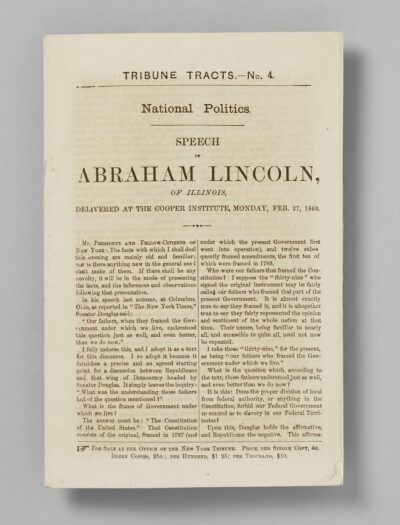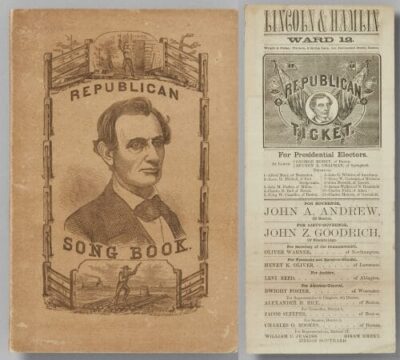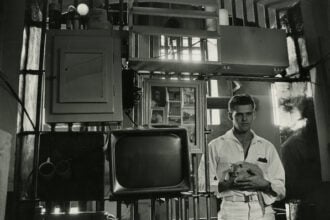This fall, a historical exhibition will celebrate one of America’s greatest presidents and his leadership of the country during its most turbulent time. Abraham Lincoln: His Life in Print will exhibit the revered but rarely seen books, documents, and ephemera that empowered Lincoln’s political ascendance, his leadership during the Civil War, and his efforts to end slavery. On view in the Ground Floor Gallery of the Grolier Club, the exhibition is composed of materials from the Americana collection of well-known philanthropist David M. Rubenstein. Abraham Lincoln: His Life in Print is timed to appear during the U.S. presidential election and fulfills the aims of the David M. Rubenstein Americana Collection to mount non-partisan presentations that foster civic engagement and historical understanding.
Among the more than 200 works on display are important editions of Lincoln’s greatest accomplishments, such as a signed Emancipation Proclamation, the Gettysburg Address, the Cooper Union Speech, and his debates with Illinois senator Stephen A. Douglas. Through original historical printings, the exhibition follows the life of Lincoln from his birth in the American West and his self-taught readings of literature, philosophy, and the law. It follows Lincoln as he is shaped by the political upheavals of the 1850s, tested by the secession of eleven Southern states, elevated by the twin efforts of emancipation and abolition, and murdered and mourned at the age of 56. The exhibition is curated by Mazy Boroujerdi, special advisor to the Rubenstein Collection, and is accompanied by a catalogue published by Marquand Books.
“Lincoln’s story is the most fascinating and exemplary story in American presidential history,” said David Rubenstein. “He is not only our greatest president for having kept the Union together during a period of terrible division and discord. He is also a model American for his tremendous humility, for having continually sought consensus, for always bettering himself through reading, and for making sure that the rights and protections enshrined in our founding documents are shared by all.”
Exhibition Highlights
“In many ways, books made Abraham Lincoln,” said curator Mazy Boroujerdi. “He became a lawyer through self-disciplined study, won the White House through the concurrent rise of American popular publishing, and remains one of the most written about figures over the 160 years since his death, with each generation reinterpreting him through new biographies and research. There is no better way to tell the story of Lincoln than through books, and there is no better subject for a book exhibition than Lincoln.”
Among the treasures on view is the only edition of the Emancipation Proclamation that Lincoln signed. One of 48 copies printed for Philadelphia’s Great Central Fair in 1864, it was originally sold for $10 a copy to raise money for the United States Sanitary Commission, a civilian relief organization that assisted the medical and hygiene efforts of the U.S. War Department. Also on view is a pocket-sized Emancipation Proclamation (1863), printed in Boston by the industrialist and abolitionist John Murray Forbes, which Northern soldiers distributed amongst African American communities at the front.
Print Made the Man

On view are printings of notable speeches that made Lincoln a rising political star, including the 1858 Lincoln-Douglas Debates. Vying with Stephen A. Douglas through seven district debates for a U.S. Senate seat in Illinois, the men’s sharply opposing opinions about slavery quickly became national news. First printed in newspapers, Lincoln published the compilation Political Debates (1860), a signed edition of which is on view. Lincoln’s 1860 Cooper Union speech was a tour de force of historical research and political rhetoric. First printed in 1860 as Tribune Tracts.—No. 4., Speech . . . Delivered at the Cooper Institute, Lincoln defined what abolitionists were fighting for and challenged proslavery factions as contrary to the Constitution, the Founders, and morality.
Lincoln’s Gettysburg Address is the most acclaimed speech by any American president. Named for the location at which the three-day military battle was won by the Union army in July 1863, at the cost of more than 51,000 Union and Confederate casualties, the speech is on view in the book An Oration Delivered on the Battlefield of Gettysburg (New York: Baker & Godwin, 1863). Another treasure featured in the show is a rare, signed souvenir copy on vellum of the Thirteenth Amendment, officially titled “A Resolution Submitting to the Legislatures of the Several States a Proposition to Amend the Constitution of the United States” (1865). Lincoln knew that only by amending the Constitution could the freedoms gained from the Emancipation Proclamation be protected.
Rubenstein sees Lincoln as continuing the project of the nation’s founding. “Lincoln was remarkably skilled in communicating that the full promise of American democracy had yet to be achieved. This is evident from his early political speeches in Illinois all the way to the Gettysburg Address. Lincoln explained to Americans the enduring relevance of the Declaration of Independence, and he explained why the Constitution needed the Thirteenth Amendment.”
A Consequential Election

Lincoln & Hamlin / Ward 12 (Boston: Wright & Potter, 1860). Courtesy of David M. Rubenstein. Photograph by Vincent Dilio.
Especially relevant during this election year is the wide array of printed materials from the campaigns of 1860, the year in which Lincoln became president, deepening tensions between North and South. Abraham Lincoln: His Life in Print tells the story of how the 16th president won by leveraging the power of popular print media. Included are the many artfully partisan 1860 campaign biographies that crafted Lincoln’s public image; the entertaining political songsters that idealized his western, rural origins; and the visually impressive campaign pamphlets and election ballots that circulated across a nation having to choose between four candidates for the highest office.
Rubenstein added, “Part of my interest in making sure we have an Abraham Lincoln exhibition in 2024 is to show Americans that all elections, especially presidential ones, are opportunities to learn about issues and their histories. The political divisions of our times are nothing compared to what Lincoln faced when he arrived at the White House. However, he was a devoted student of the issues of his day, so while he started his career more or less reflecting his times, by the time he died he was very much ahead of his times.”
Publication & Programming
The exhibition is accompanied by the catalogue Abraham Lincoln: His Life in Print: Books and Ephemera from the David M. Rubenstein Americana Collection, available in Autumn 2024 from Marquand Books. An illustrated study of the historical printings that depict Lincoln’s life and legacy, the book features a foreword by David Rubenstein and is edited by Mazy Boroujerdi. Twelve leading writers and historians of Lincoln have each contributed an essay on an aspect of the sixteenth president’s life and legacy, including Robert Bray, Joshua Claybourn, Jonathan Earle, Martha Hodes, Harold Holzer, Glenn W. LaFantasie, Chandra Manning, Edna Greene Medford, Lucas E. Morel, David S. Reynolds, Edward Steers Jr., and Ted Widmer. (272 pages | 401 color plates, 14 halftones | 8.125 x 10.375 | Cloth | $60.00 | ISBN: 9781605831183.)
The Grolier Club will host related free public programs, including lunchtime tours and talks, to be announced later this fall. Details can be found at http://grolierclub.eventbrite.com.























